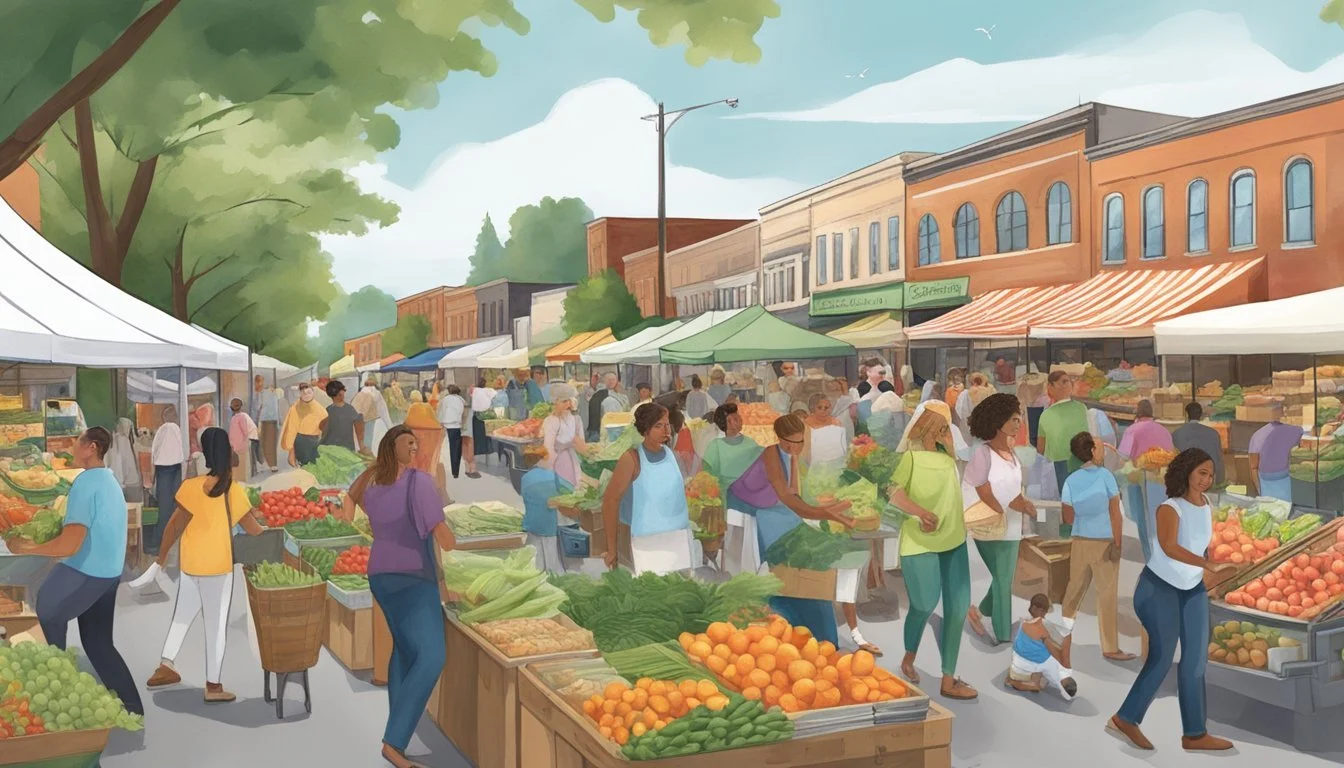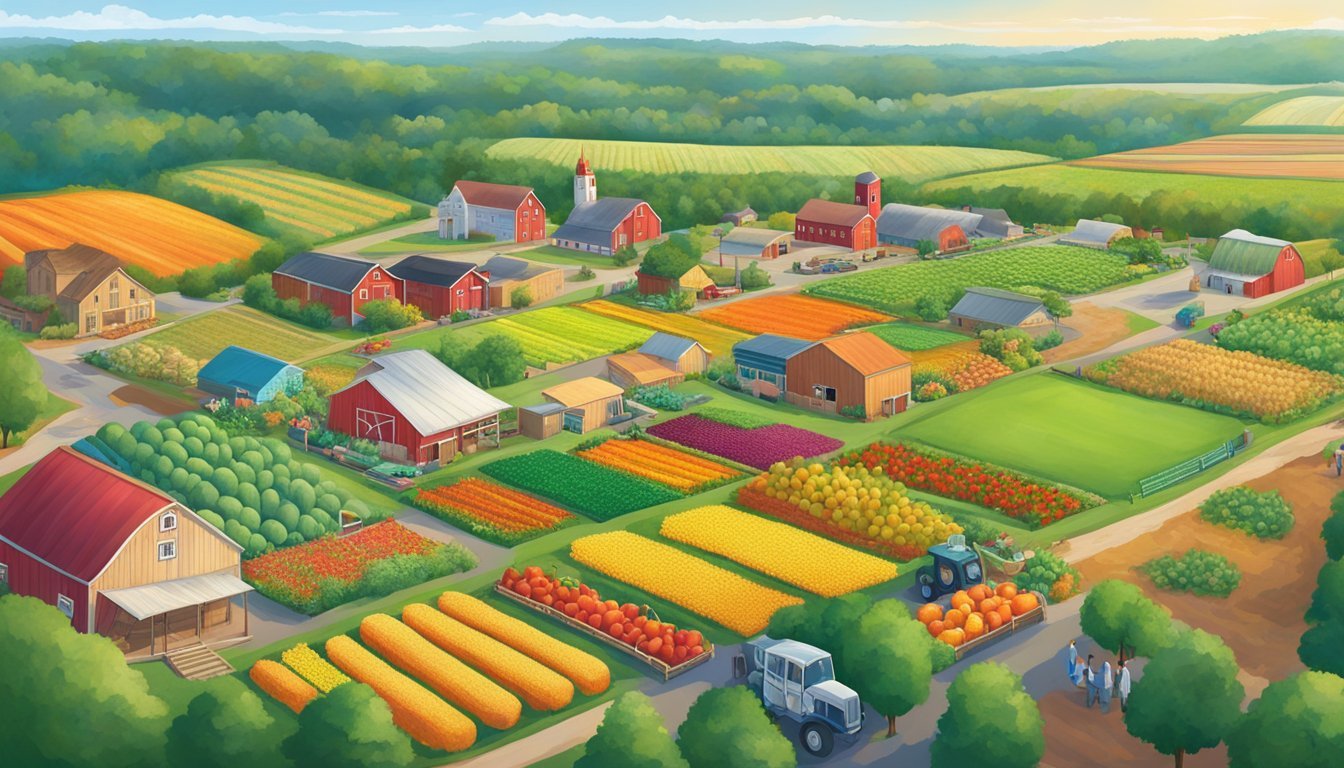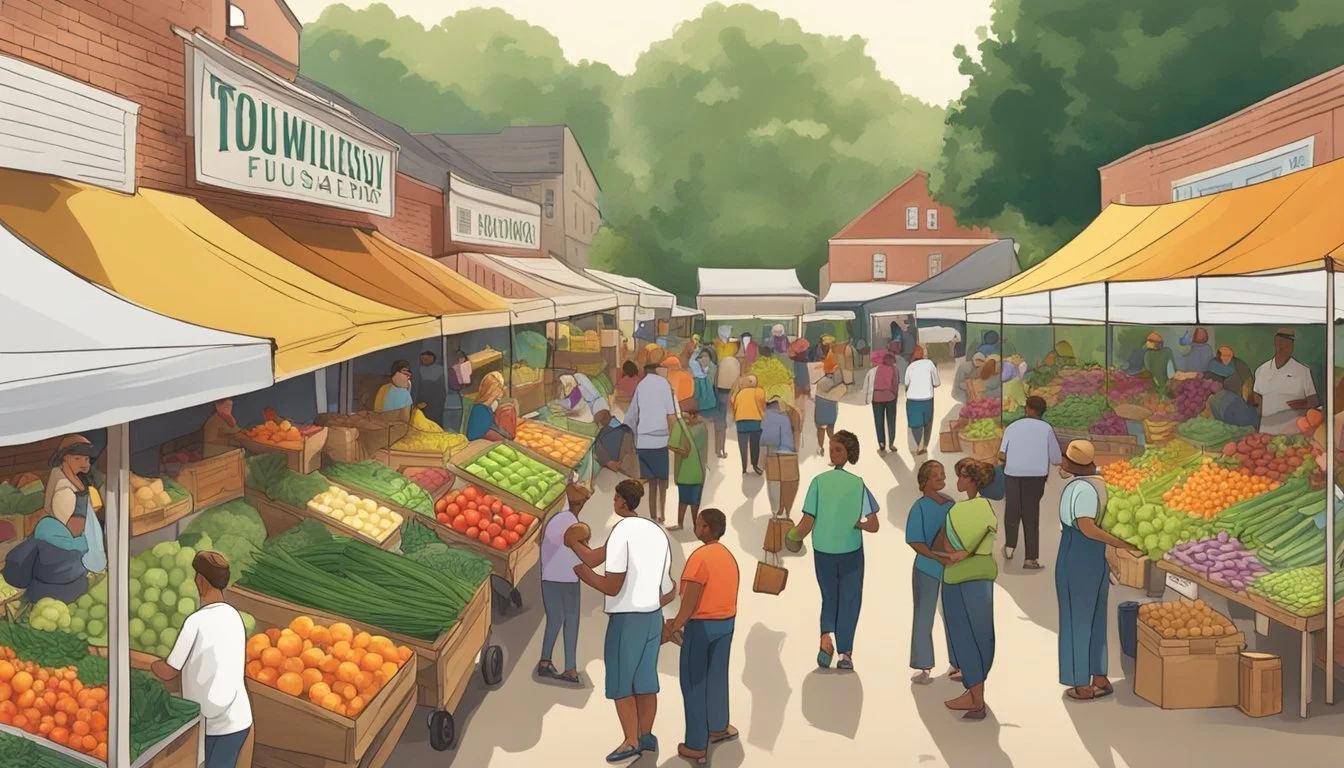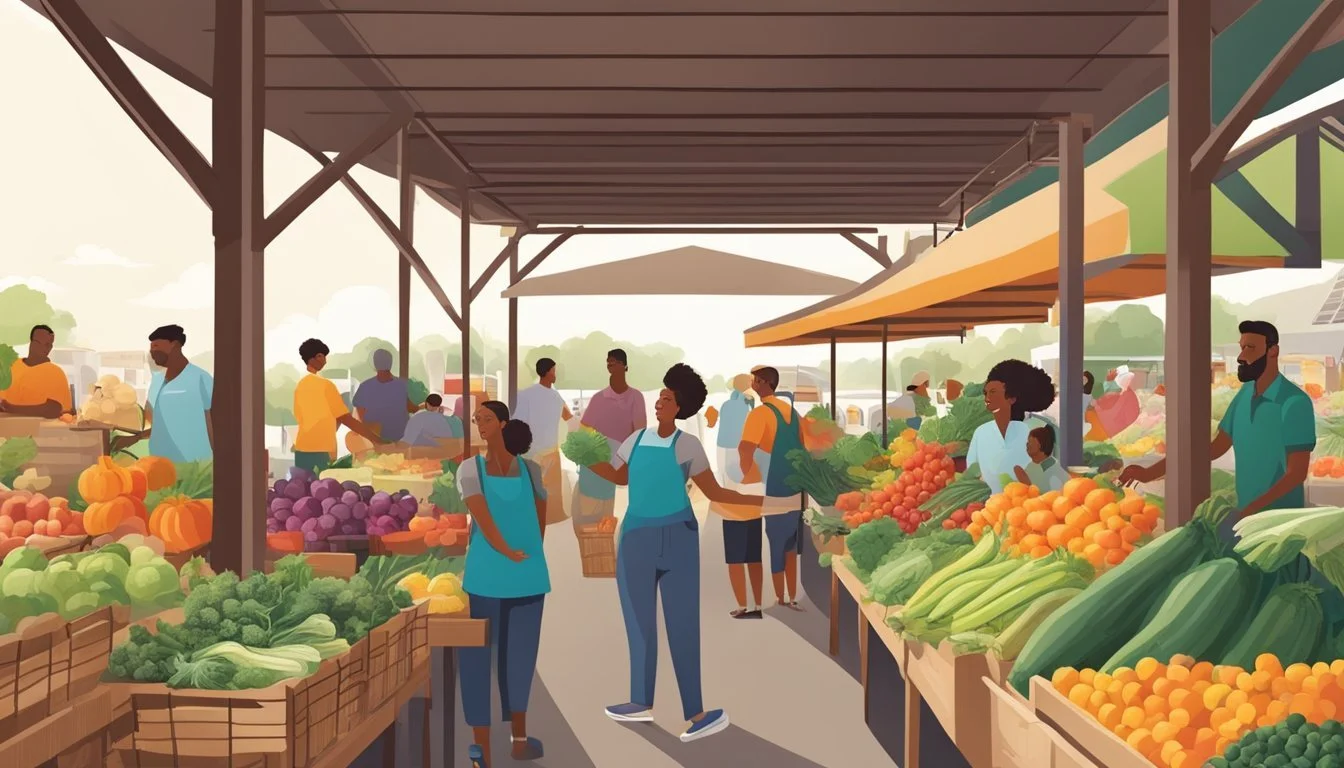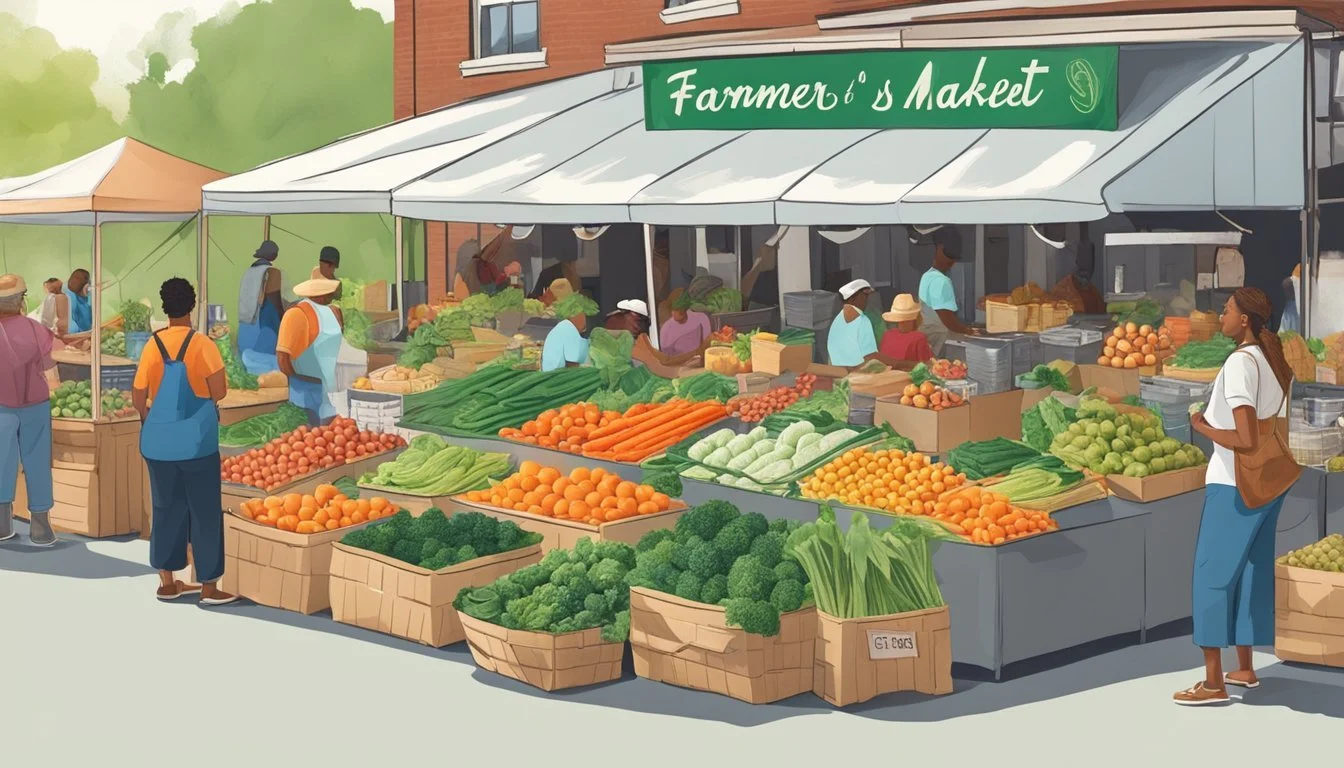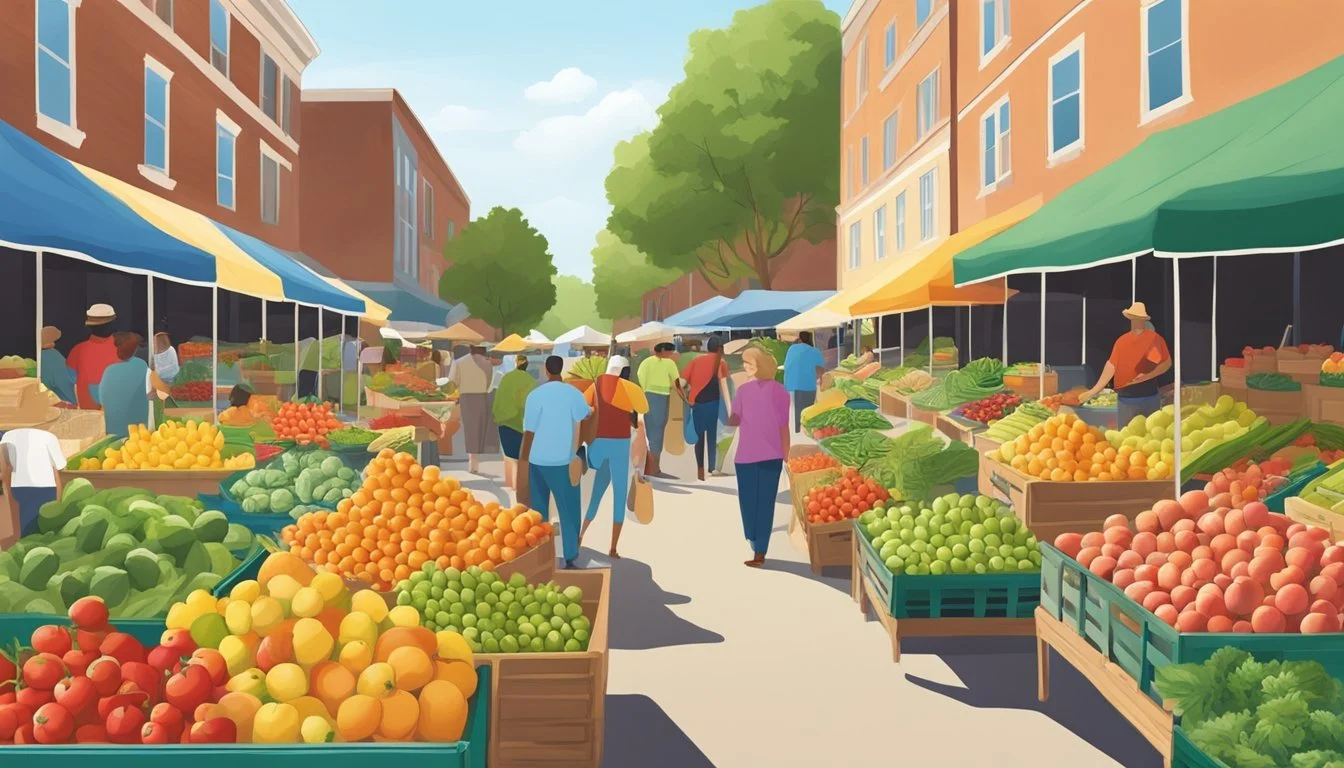Community Supported Agriculture (CSA) in Tuscaloosa, AL
A Guide to Local Farm Shares
Community Supported Agriculture (CSA) is a farming model that has found a receptive audience in Tuscaloosa, Alabama. This approach allows consumers to buy shares of a farm's harvest in advance, creating a partnership between local residents and farmers. In Tuscaloosa, the CSA model not only supports the financial stability of farms but also forges a closer connection between the people and the source of their food. CSA members receive weekly boxes of fresh produce throughout the growing season, ensuring they get the freshest and most flavorful produce while supporting the local agricultural economy.
The city of Tuscaloosa has embraced the farm-to-table movement through these CSA programs, helping small family farms to thrive and providing city residents with access to nutritious, farm-fresh produce. By signing up and paying for a share of the anticipated harvest, CSA participants in Tuscaloosa are guaranteed a selection of seasonal produce each week, sourced directly from the local farms they have invested in. This sustainable practice benefits the environment by reducing food mileage and packaging waste, and enhances community wellbeing by offering foods that are often organic and more nutrient-rich than store-bought alternatives.
In Tuscaloosa, CSA is more than just a way to buy vegetables. It's a testament to the community's commitment to sustainability, local economy, and healthy living. These CSA programs embody an economic anchor for the hearty soil of Alabama's farms and represent a conscious choice by Tuscaloosa's residents to immerse themselves in a cycle of local growth, both agricultural and communal.
Understanding CSA
Community Supported Agriculture (CSA) is a model that connects consumers directly with farmers in Tuscaloosa, Alabama. It fosters a partnership where members receive fresh produce while supporting local farms.
History and Principles
CSA originally developed in Europe and Japan in the 1960s and was introduced to the United States in the 1980s. Tuscaloosa's CSA history began in 1989 with the start of the Tuscaloosa CSA in Coker. The principles of CSA center around shared risk and reward between farmers and community members, emphasizing sustainable agriculture and organic farming practices.
CSA Model and Membership
In a CSA, members purchase a "share" of a farm's harvest in advance. This model provides farmers with upfront capital to cover anticipated costs for the season. Membership typically involves a one-time sign-up fee with weekly costs for produce baskets, which can vary in size.
Membership Structure:
Sign-up fee: Usually a one-time payment
Weekly basket cost: Varies based on size (e.g., $25, $37.50, $49)
Membership Benefits:
Regular supply of organic vegetables
Supporting local sustainable agriculture
Benefits of Joining a CSA
Members of a CSA enjoy several benefits:
Access to fresh, organic vegetables.
Investment in local food systems and sustainable practices.
Building relationships with farmers and the community.
Education on seasonal produce and sustainable agriculture.
Challenges and Considerations
While CSAs offer numerous advantages, there are challenges:
Dependence on weather and seasons affecting produce availability.
Need for upfront investment without guarantee of produce quantity.
Learning to use a wide variety of vegetables that one may not be familiar with.
CSAs require both farmers and members to adapt to variables such as fluctuating yields, which are natural in farming. Despite these challenges, CSAs remain a vital link between local farms and the communities they serve.
Tuscaloosa's CSA Landscape
In Tuscaloosa, AL, community supported agriculture (CSA) is a strong pillar of the local food movement, providing a wealth of fresh produce directly from farm to table while fostering sustainable agriculture practices.
Local CSA Programs
Various community supported agriculture (CSA) initiatives operate within Tuscaloosa, connecting residents with an array of fresh, locally-grown produce. Notable among them is the Tuscaloosa CSA, which stands out as one of the pioneering programs in the region, having started in 1989. Its network allows consumers to purchase shares of the harvest from small family farms, ensuring members receive seasonal produce and farmers attain a pre-harvest financial base.
Agricultural Offerings
The range of produce offered through Tuscaloosa's CSA programs is extensive:
Vegetables: Includes staples like potatoes, tomatoes, cucumbers, zucchini, onions, carrots, and specialty items like okra and eggplant.
Fruits: Strawberries, melons, and an assortment of other seasonal fruits are cultivated for distribution.
Leafy Greens: Varieties such as kale, arugula, and lettuce.
Root Vegetables: Turnips, radishes, and sweet potatoes feature prominently.
Legumes: Snap peas and green beans are grown in local fields.
Others: Seasonal varieties such as pumpkins, winter squash, and a colorful array of flowers.
Supporting Local Economy
By investing in CSA programs, Tuscaloosa residents play a vital role in supporting the local economy. Small family farms benefit from the direct sales model, circumventing the need for intermediaries typical in farmers' markets or grocery stores. This direct relationship not only bolsters farm revenue but also strengthens the communal ties through shared commitment to local food and sustainable practices.
Environmental Impact
Embracing CSA in Tuscaloosa contributes positively to environmental stewardship. Farms practicing organic or sustainable agriculture methods eschew synthetic fertilizers and pesticides, promoting healthier soils and ecosystems. Moreover, since the food is locally sourced, the carbon footprint associated with transportation is greatly diminished, and packaging waste is often reduced due to minimal processing and handling of the produce.
Membership and Support
In Tuscaloosa, AL, Community Supported Agriculture (CSA) provides a structure that fosters a direct partnership between local farms and community members. This partnership is centered on the purchase of "shares" of the farm's harvest. Membership in a CSA involves upfront financial commitment, offering vital support to local farms.
How to Become a Member
To become a member of a Tuscaloosa CSA, individuals typically secure their spot by paying for their shares in advance for the season. This payment can often be made via check or through electronic payment systems, with some CSAs offering online sign-up facilities. An initial sign-up fee may be required, setting the stage for weekly or bi-weekly produce deliveries.
Membership Costs:
One-time sign-up fee: Generally around $30.
Weekly Basket cost: Ranges based on size - $25, $37.50, $49.
Member Responsibilities
Members are usually expected to pay for the whole season's produce upfront, which helps the farm plan and budget accordingly. This system encourages members to share in the risks and rewards of farming, including fluctuations in harvest due to weather or other factors. Members may also have the option to participate in volunteer activities, contributing to the farm's operational success.
Community Involvement and Education
CSAs in Tuscaloosa often extend beyond simply providing produce; they engage in agritourism and educational initiatives. This includes farm visits, workshops, and other events that foster a deeper understanding of sustainable agriculture among community members. Such involvement fortifies the connection between consumers and their food sources, promoting a more sustainable local food system.
Communication with Members
Farms typically communicate with members through regular newsletters and updates. These communications not only inform members about the status of their harvest but also provide valuable insights such as recipes for using the produce. Effective communication helps to cultivate strong relationships between the farm and its community, ensuring a cohesive CSA program.
Regular updates may include:
Status of harvest
Upcoming events
Recipes and storage tips for the week's produce
CSA Operations
Community Supported Agriculture (CSA) programs in Tuscaloosa exhibit a well-structured approach to agricultural production and consumer engagement. Careful planning and diversified offerings mark the key operations of these sustainably-minded ventures.
Seasonal Planning
Tuscaloosa farmers initiate their CSAs by crafting detailed plans tailored to the locale’s seasons. They carefully select seeds that will yield a variety of produce, including fruits and vegetables, appropriate to the regional climate. Seasonal planning is critical, considering factors like crop rotation and harvest times to ensure a steady supply of fresh produce throughout the season.
Harvesting and Distribution
When the harvest season arrives, Tuscaloosa farms become hubs of activity. CSA shares are typically packed with freshly picked vegetables, fruits, and other farm products. Distribution strategies are crucial for timely deliveries, and many farms leverage pickup locations, farmers markets, or direct-to-door delivery services to get their produce to consumers.
Marketing and Sales Strategies
Marketing efforts for CSAs in Tuscaloosa hinge on fostering a sense of community and connection between farmers and consumers. Sales strategies often include online platforms for ease of purchase and engagement with the local food movement. Marketing materials emphasize the quality and variety of the food, including vegetables, fruit, meat, baked goods, and even flowers.
Diversifying Products
Diversification is a cornerstone of many Tuscaloosa CSAs. Beyond just vegetables, these operations may offer fruit, meat, baked goods, and flowers to attract a wider consumer base. Offering a range of products not only caters to diverse consumer needs but also helps mitigate the risk inherent in agriculture by spreading it across various types of harvest.
Additional Offerings and Events
Community Supported Agriculture (CSA) in Tuscaloosa, AL, enriches the connection between the community and local farms by providing more than just a regular supply of fresh, organic vegetables. The CSA experience is enhanced through various additional offerings and events, which focus on agritourism, specialty products, educational workshops, and seasonal celebrations that foster a deeper sense of community and awareness of sustainable farming practices.
Agritourism Activities
Tuscaloosa's CSA farms often host agritourism events that invite members to experience farm life. Activities might include guided farm tours to see where organic vegetables like squash, collards, and kohlrabi are cultivated, or fishing events for families to learn about sustainable aquaculture.
Specialty Produce and Products
In addition to seasonal produce, some Tuscaloosa CSAs offer a range of specialty items. This can include:
Honey: Local wildflower honey from farms like Hewett’s Honey Farm.
Baked Goods: Freshly baked bread or pastries incorporating organic ingredients from the farm.
Herbs and Flowers: A variety of culinary herbs and ornamental flowers.
Dairy Products: Small-batch butter or cheese made using organic practices.
Cooking and Nutrition Workshops
CSAs in Tuscaloosa provide cooking and nutrition workshops where participants learn to prepare healthy meals using the CSA's organic vegetables. These workshops might focus on recipes for seasonal vegetables like squash and collards or creating nutrient-rich salads.
Seasonal Events and Celebrations
Seasonal events are a highlight for many CSA members, celebrating the harvest and community. These can include:
Spring Planting Festival: Welcoming the start of the growing season with activities and education on planting organic vegetables.
Harvest Dinners: Featuring dishes made with produce like fish, meat, and a variety of seasonal vegetables, these dinners are a time for the community to come together and appreciate the bounty of the season.
Fall Pumpkin Pick: A family-oriented event where members can pick their own pumpkins and enjoy autumn-themed activities.
Future of CSA in Tuscaloosa
Community Supported Agriculture (CSA) in Tuscaloosa is poised for growth, influenced by emerging trends, local and broader policies, advocacy efforts, and community engagement. The integration of these factors will play a vital role in the development and success of CSA programs in the region.
Emerging Trends
CSAs in Tuscaloosa are beginning to incorporate more sustainable and organic farming practices to meet consumer demand. These trends include innovative crop rotation, reducing reliance on chemicals, and focusing on soil health. Technological advancements such as online membership subscriptions and social media marketing are helping CSAs in Tuscaloosa to better connect with local food advocates and educate the community about the benefits of sustainable agriculture.
Local and National Influence
The Tuscaloosa CSA model benefits from both local support and national movements promoting local food consumption. As a result, CSAs are likely to see an increase in membership and broader community involvement. Partnerships between CSAs and local restaurants or businesses that aim to source local foods can strengthen the local food system, creating a more robust market and driving further interest in sustainable agriculture practices across Alabama and the United States.
Advocacy and Legislation
Ongoing advocacy for sustainable agriculture and supportive legislation are crucial for the future of CSAs in Tuscaloosa. Efforts to pass laws favoring small-scale, local farmers and organic producers could lead to more significant investments in CSA models. Advocacy groups often facilitate the connection between farmers and legislators to craft policies that foster a vibrant local food community.
Continued Community Engagement
The future success of CSAs in Tuscaloosa hinges upon continued community engagement. This includes educational programs to inform the public about the environmental and health benefits of sustainable agriculture. As CSA membership grows, it reinforces the relationships between farmers and community members, fostering a shared investment in the health of the local population and the land.
The CSA model in Tuscaloosa, with its focus on fostering direct connections between local farmers and consumers, continues to be a fundamental framework for advancing sustainable agriculture in the region.
Conclusion
Tuscaloosa, AL has experienced a notable growth in the adoption of Community Supported Agriculture (CSA), reflecting a broader nationwide trend towards sustainable agriculture and community engagement. This model supports local food systems, often incorporating organic farming practices that benefit both the environment and public health.
CSAs in Tuscaloosa, such as the Tuscaloosa CSA founded in 1990, have established themselves as integral components of the local community. They provide consumers with the opportunity to invest directly in local farms, receiving a weekly share of fresh produce in return. This exchange fosters a relationship between consumers and farmers, which aids in educating the public about the food production process and the importance of sustainable practices.
Key impacts of CSA in Tuscaloosa include:
Strengthened local economy: Money spent on CSA shares stays within the local area, providing financial stability for farmers.
Environmentally friendly: Reduced food miles and a focus on sustainable farming minimize the carbon footprint.
Healthier choices: Access to a variety of fresh, often organic, produce encourages healthier eating habits.
Community ties: Shareholders' direct involvement with the farm operation builds a sense of community and mutual support.
CSA initiatives in Tuscaloosa exemplify a successful intersection of agriculture and community-focused values, serving as models for local food systems and suggesting a positive trajectory for the future of farming in the region. The CSA model indeed represents a scalable blueprint for fostering sustainable agricultural practices, community resilience, and economic vitality in Tuscaloosa and beyond.

